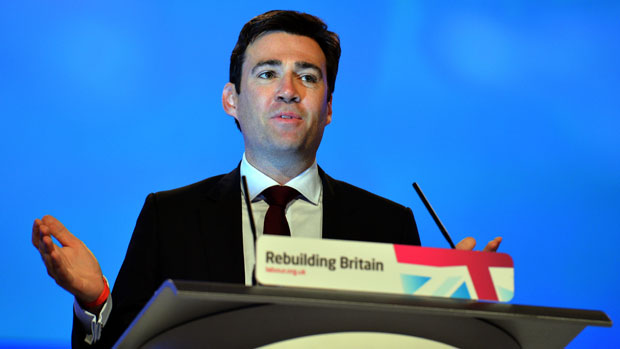Andy Burnham's ten key economic policies
Shadow health secretary pledges to extend new higher minimum wage and scrap tuition fees

A free daily email with the biggest news stories of the day – and the best features from TheWeek.com
You are now subscribed
Your newsletter sign-up was successful
Andy Burnham has launched a manifesto setting out his plans for the Labour leadership, as he fights back following the recent surge for radical rival Jeremy Corbyn in recent weeks.
City AM cites a poll showing Burnham remains a clear favourite among Labour voters to lead the party, ahead of Corbyn by some 15 points. He has now also been reinstated as the bookmakers' favourite to win the vote when it is announced in September.
The manifesto sets out the shadow health secretary's vision for the economy and details a number of key policies he would adopt for the party to take into the next election. By his own admission the key issue for Labour is to present a compelling case on the economy, so what can we expect
The Week
Escape your echo chamber. Get the facts behind the news, plus analysis from multiple perspectives.

Sign up for The Week's Free Newsletters
From our morning news briefing to a weekly Good News Newsletter, get the best of The Week delivered directly to your inbox.
From our morning news briefing to a weekly Good News Newsletter, get the best of The Week delivered directly to your inbox.
1. Policies to promote a "sustainable economy, based on growth and investment... a re-balanced tax system and a labour market that works for all". As you might expect from a Labour leader, really.
2. A commission along the lines of the Beveridge Report which "laid the foundations for the creation of our welfare state", but which will look at how to fund public services and shift the burden of taxation, including "examining the case for a land value tax to replace business rates".
3. This review would test the idea of a new levy to fund social care, which would see that "everybody is asked to make a contribution according to their means" to pay for universal provision.
4. It would also look at the case for introducing a graduate tax to replace student loans, which the BBC says Burnham has described as a "millstone of debt", including how to cover the shortfall in funding for universities in the short term.
A free daily email with the biggest news stories of the day – and the best features from TheWeek.com
5. Taking on George Osborne on his own re-shaped territory, Burnham would extend the new higher minimum wage, the so-called 'national living wage', "to all ages", effectively removing the age 25 threshold to qualify - and increasing costs to businesses.
6. Another employment policy would be the banning of 'zero-hours' contracts, which many say simply offer flexibility but are blamed for reducing the certainty of work and branded 'exploitative' by others.
7. Renationalising the railways, which The Guardian says will also see the establishment of a "national rail governing body accountable to the transport secretary". Polls say 60 per cent of the public support bringing railways back under public control.
8. 'Rent-to-own', a Government-supported housing scheme which allows first-time buyers to get on the ladder without a deposit by starting out as tenants, would be extended. A direct riposte to Corbyn, who has said he would extend the right-to-buy discounts to private renters.
9. The Transatlantic Trade and Investment Partnership, or TTIP, being negotiated between the EU and the US would be put in doubt. Burnham will give no "guarantee of Labour support... until we see the final text" and will demand exemptions for public services.
10. As he has said publicly a number of times in the past, Burnham will not give any further backing for fracking, the hydraulic drilling process which has prompted an energy boom in the US, until there is more evidence it is safe.